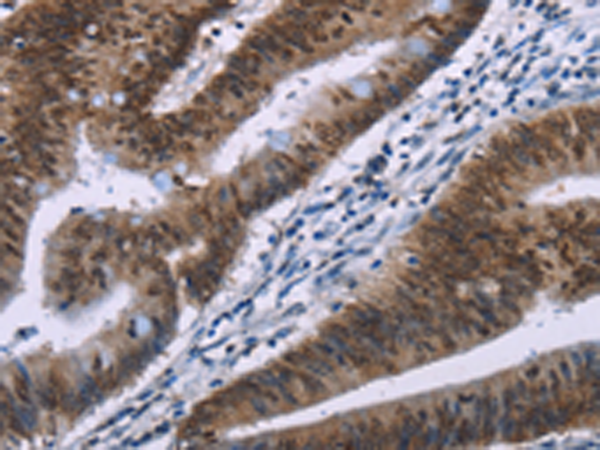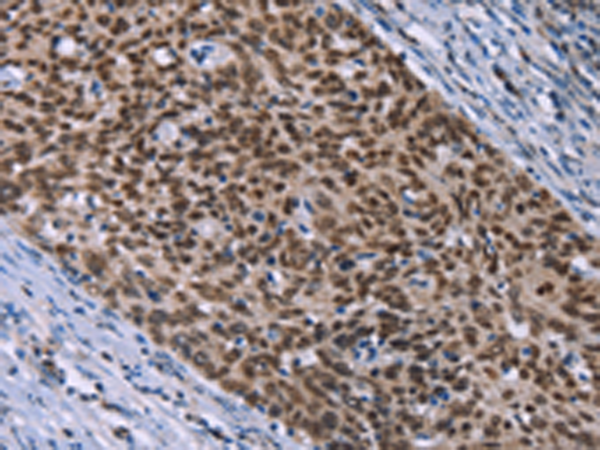

| WB | 咨询技术 | Human,Mouse,Rat |
| IF | 1/20-1/50 | Human,Mouse,Rat |
| IHC | 咨询技术 | Human,Mouse,Rat |
| ICC | 1/50-1/200 | Human,Mouse,Rat |
| FCM | 1/20-1/100 | Human,Mouse,Rat |
| Elisa | 咨询技术 | Human,Mouse,Rat |
| Aliases | HMG-R, HMGIY, HMGA1A |
| Host/Isotype | Rabbit IgG |
| Antibody Type | Primary antibody |
| Storage | Store at 4°C short term. Aliquot and store at -20°C long term. Avoid freeze/thaw cycles. |
| Species Reactivity | Human, Mouse, Rat |
| Immunogen | Synthetic peptide of human HMGA1 |
| Formulation | Purified antibody in PBS with 0.05% sodium azide and 50% glycerol. |
+ +
以下是3篇与HRAS抗体相关的文献摘要信息:
1. **文献名称**:*"Oncogenic activation of human RAS proteins analyzed by monoclonal antibodies"*
**作者**:Furth ME 等
**摘要**:该研究利用针对HRAS蛋白的单克隆抗体,分析了致癌突变体(如G12V)的结构变化,揭示了突变导致HRAS持续激活的分子机制,为癌症诊断抗体开发提供依据。
2. **文献名称**:*"Immunohistochemical detection of HRAS overexpression in thyroid tumors"*
**作者**:García-Rostán G 等
**摘要**:通过特异性HRAS抗体对甲状腺肿瘤组织进行免疫组化分析,发现HRAS在滤泡型癌中显著过表达,提示其作为鉴别诊断标志物的潜在价值。
3. **文献名称**:*"Targeted degradation of oncogenic HRAS using antibody-PROTAC conjugates"*
**作者**:Xie T 等
**摘要**:研究团队开发了一种结合HRAS抗体与蛋白降解技术的复合物(PROTAC),成功在体外模型中诱导突变HRAS的降解,为靶向RAS驱动型肿瘤提供新策略。
注:以上内容为模拟摘要,实际文献需通过PubMed或Google Scholar检索确认。
The HRAS antibody is a crucial tool in molecular and cancer research, targeting the HRAS protein—a small GTPase belonging to the RAS family. HRAS plays a pivotal role in regulating cell signaling pathways, including the MAPK/ERK and PI3K/AKT cascades, which control cell proliferation, differentiation, and survival. Mutations in the HRAS gene (e.g., G12V, G13D) result in constitutively active HRAS proteins, driving uncontrolled cell growth and contributing to tumorigenesis. These mutations are linked to various cancers, such as bladder, thyroid, and colorectal carcinomas, as well as developmental disorders like Costello syndrome.
HRAS antibodies are designed to detect endogenous HRAS protein levels, localization, and activation status in experimental models. They are widely used in techniques like Western blotting (WB), immunohistochemistry (IHC), immunofluorescence (IF), and flow cytometry. Specific antibodies may distinguish between wild-type and mutant HRAS or recognize post-translational modifications (e.g., farnesylation) critical for membrane localization and function. Monoclonal antibodies offer high specificity, while polyclonal variants may detect broader epitopes.
In research, HRAS antibodies help elucidate oncogenic mechanisms, evaluate therapeutic targets (e.g., RAS inhibitors), and assess drug efficacy in preclinical studies. Their application extends to diagnostic pathology for identifying HRAS-driven malignancies. Given the challenges in directly targeting RAS proteins, these antibodies remain vital for studying downstream effectors and compensatory pathways in cancer biology.
×